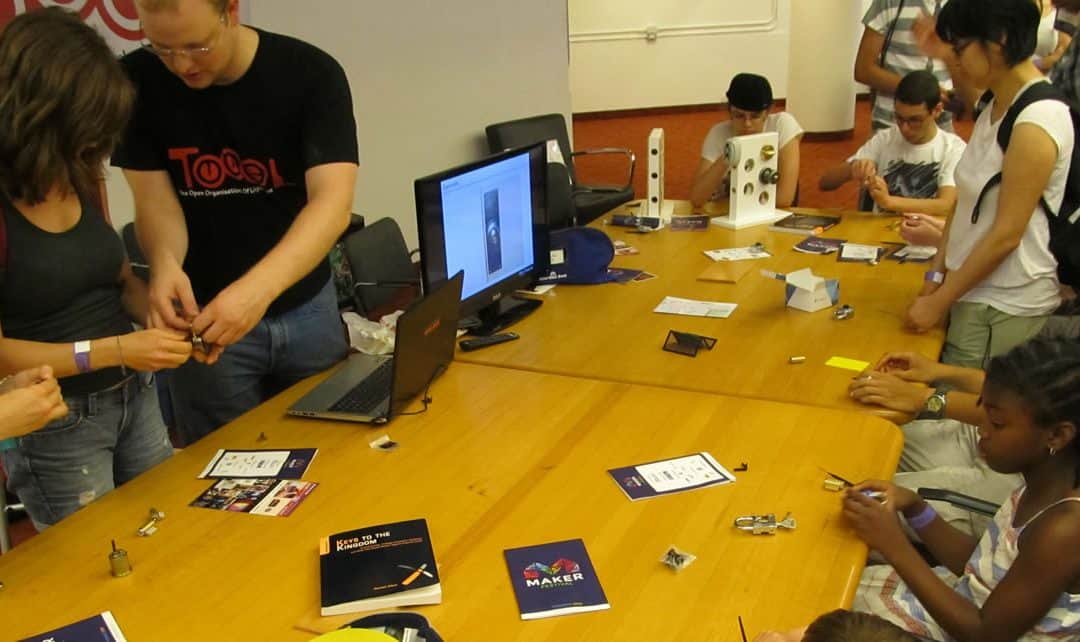Pssst! Want to learn how to pick a lock? Actually there’s no need to whisper or hide in the shadows, not anymore. Some security experts in Canada are teaching anyone who is interested how to open a variety of locks without using a key.
If this is all news to you, you’re not alone. Many members of the public first learned about this increasingly popular, albeit unconventional, hobby during the annual Maker Festival at the Toronto Reference Library in July.
A large table was strewn with various locks, lock picking devices and manuals, and visitors were invited to give locksport a try. About a dozen people, most of them youths, were highly engrossed in the challenge.
“I did it,” said one teenager triumphantly, explaining he’d just picked his second lock in under an hour. Others struggled while consulting a computer screen that displayed the internal structure of a typical lock. Experienced lock pickers were on hand to facilitate the session and answer questions.
But the first reaction of many adults when they arrived on the scene was typically one of dismay and shock. “Is this legal?” one man mused to no one in particular.
“Great, they’re teaching people how to break into homes,” said another. “No wonder so many bikes get stolen,” chimed a third observer, who, after a few moments, conceded the skill could come in handy if you ever locked yourself out of your home or car.
Just then, coincidentally, information popped up on a screen explaining the code of ethics by which these hobbyists were expected to abide.
“The first thing we cover when we’re teaching is basically two rules,” says Paul Lariviere, a Toronto security consultant. “Don’t pick locks you don’t own and don’t pick locks you rely on. Some people practice on the front door of their house, but it’s possible to damage a lock and then you’d be in a worse state.”
The group with the display at the Maker Festival was the Toronto chapter of TOOOL (The Open Organization of Lock pickers). It has chapters around the world including dozens in the U.S. and at least two in Canada – in Toronto and Montreal – that meet regularly.
You may wonder who exactly is attending these gatherings and why.
“It varies greatly,” says Lariviere. “Some are locksmiths and do it for a living; some are security consultants like me. And there are regular people that are curious and like to tinker with things. They see it as a mechanical puzzle to solve, a challenge and a fun pastime.”
At one of the meetings the group went to a local dollar store and purchased several items they attempted to use as lock opening devices.
Some people seem to have a knack for lock picking, says Lariviere. One Christmas he brought all his locks and tools to a family gathering and taught everyone what he knew. “Months later my aunt drove all the way to the cottage and forgot the keys but she managed to open the door, so it saved a lot of time and money.”
Naturally some homeowners wonder if they should be wary of the increasing interest in lock picking, in case it attracts criminal elements, but Lariviere thinks there’s no reason to worry. “They (the robbers) would have to invest a lot of time in learning it and different locks have different quirks. It’s just not worth their time to put in months or years practicing,” he says. “They could go through a broken window. There are lots of ways to get into a house. Lock picking is not common. They’d be exposed, out in the open.”
As a security consultant, friends often ask Lariviere for advice.
“Someone I went to school with was buying her first house after graduation and asked me what I’d recommend for a pick-proof lock for her home and I told her not to bother spending her money on that because she has windows and other easier points of entry. Take the money and get an alarm system,” Lariviere says, adding homeowners need to think in terms of layers of security.
“There’s not one thing to solve it all. You need layered protection.”
Diane Slawych is a contributing writer for REM.













